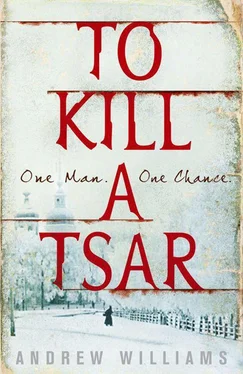‘No,’ said the dvornik sulkily.
‘Are you sure about these two?’
‘Yes.’
‘This one?’
Penkin nodded.
‘Wait here. Don’t touch anything.’ The policeman pushed his chair away from the desk and crossed the office to a door in the opposite corner. He opened it and Penkin caught a glimpse of a brightly lit room with clerks bent over desks before it swung to behind him. The time slipped by and the dvornik began to grow impatient. He had been away from the Kozlov house for almost half an hour. The maid could not be trusted to make a decent job of lying for him — not for five kopeks. At last the door opened again.
‘You’re coming with me,’ Constable Rostislov said, lifting his uniform coat from a peg.
‘But I have to be back. They’ll miss me.’
The policeman laughed. He was clearly in great good humour.
‘Too bad. We’re going to Fontanka 16.’
The earnest faces and desperate talk left a dull grey impression on Frederick Hadfield’s mind for days and he resolved to be busy if another invitation was delivered to his door. He thought of Lydia Figner often and found himself consumed by feelings of guilt about the careless way he had ended their affair. As the days passed and he heard nothing more from her sisters, he began to wonder if they had just dismissed him as a hopeless case, beyond redemption, another fuzzy liberal without the vision or courage necessary for their great socialist project. For the most part, he was happy to be considered so, even if it was impossible to entirely ignore the truth of Vera’s parting shot: there is no freedom in Russia. With a stroke of his pen the tsar had made the army master of life and liberty in his empire. Men and women suspected of ‘subversive tendencies’ could be brought before a court martial and either imprisoned or banished without any recourse to an appeal.
From time to time he would cross the Neva by the pontoon bridge at the eastern tip of Vasilievsky and stare across the water at the grim stone face of the St Peter and St Paul Fortress. The enemies the state simply wished to forget were held in the cellars of the Alexeevsky Ravelin until cold and hunger carried them away. Would the Figners die in this Russian Bastille? And he would imagine Vera shivering in the darkness, her white face still defiant, an unspoken ‘Didn’t I say so’ in the damp air between them.
But Hadfield was too busy on the wards of the Nikolaevsky and with a growing list of private patients to brood for long on the fate of the Figners or the country’s future. With the help of his aunt, he began to establish his reputation as a physician in embankment society, in particular with Anglo-Russian women of mature years, of whom there were a goodly number. So much nicer than those German doctors was the general view, and so well qualified. Some remembered his father with affection, and one old lady had ‘the honour’ to have been examined by his great-uncle, Sir James; ‘You are so like him, dear,’ she had said, with a tear of memory in her eye. And it had been suggested to him more than once that the emperor would one day favour the great-nephew of such a loyal servant of the House of Romanov with a royal appointment. Hadfield was grateful but a little embarrassed by the attention and looked forward to his afternoons at the Nikolaevsky with those who could not afford to pay for his services and would never dream of inviting him to dinner.
On the last Sunday in April, the dvornik huffed and puffed up the stairs to his apartment with a note from the British embassy. It was from one of the consuls, an old friend of his father’s: the ambassador’s wife had taken to her bed with a fever and he would be grateful if Dr Hadfield could spare the time to attend upon her. A victoria was waiting at the door for an answer, the surly coachman tapping his whip impatiently against its iron frame.
The embassy and its residence were at the seat of imperial power on the embankment before the Field of Mars where the emperor reviewed the royal regiments, within hailing distance of his palace. A fine eighteenth-century mansion, it had belonged to the first Alexander’s tutor and councillor, and the tsarconqueror had often danced in its famous White Ballroom. With less ceremony, Hadfield was shown up the bright marble staircase, through the embassy’s formal rooms and into the private quarters in the east wing.
The Countess of Dufferin was suffering from no more than a severe head cold and an acute attack of anxiety. But Hadfield was charming and concerned and left her with just the sort of large brown bottle she was expecting and would have been disappointed not to receive. A generous dose of honey and lemon to be taken on a silver spoon. By the following day she was much improved and fulsome in her praise for ‘my doctor’ and his ‘miracle’ cure.
Hadfield visited her twice more and, as her spirits improved, he found her to be engaging, with a keen interest in her new home. Lady Dufferin was not handsome: she had an angular face with a heavy brow, small dark eyes and loose curled hair, difficult to tame, judging by the number of pins and bands used to hold it in place. But the impression was of a lively woman with a wry, self-deprecating sense of humour. A little guarded — no doubt in keeping with her position — she had none of the aristocratic hauteur he had encountered in some of his patients in London. She questioned Hadfield closely about his work and expressed an interest in visiting the Nikolaevsky. The ambassador would accompany her, she said, the Earl of Dufferin wished to be familiar with all aspects of Russian life.
‘And your uncle, General Glen… Of course, he has made us very welcome, but I fear I may have offended him. I understand the general goes to church every day during Passion Week. Do you go to church that often, Doctor?’
‘Not as often as I should and not as often as my uncle would like,’ Hadfield said with a little shake of the head.
He had grown a thick diplomatic skin — the loss of his father, the strange ‘Russian boy’ at an English boarding school, the studied patience of medical practice — these had shaped a personality naturally inclined to please, but had also taught him a comfortable degree of detachment. An admirer of Darwin and Huxley, he was an agnostic, a firm believer in natural selection and the descent of man, but he was careful not to express these views in what his mother liked to describe as ‘polite company’. For her sake he had accompanied the Glen family to the English church on Easter Sunday.
‘Your uncle is a man of forthright opinions. He was concerned that Dufferin and I had only been to the English church once at Easter.’
Hadfield’s face must have betrayed the irritation he felt, for Lady Dufferin lifted her eyes to his and her patient smile became a conspiratorial one: ‘Well, the general recommended you. In practitioners, at least, his judgement is not to be faulted.’
The following day the embassy coachman delivered a warm note from the ambassador requesting the pleasure of Dr Hadfield’s company at the opera.
His father’s diamond studs, top hat, tails and black leather shoes from Jermyn Street — later he would smile at the rich irony of meeting her at the theatre in the company of a countess.
The Dufferin party was seated in the grand tier to the right of the imperial suite in a box designated suitable for grand dukes and ambassadors. The Mikhailovsky was glittering silver in the brilliant light cast by the new electric sconces the management had installed at great expense.
Her Ladyship had invited what she called a ‘select band of six’; Hadfield, the first and second secretaries at the embassy, and The Times ’s man in St Petersburg, Mr George Dobson. It was a lively group, and the ambassador clearly believed he was among friends, presuming on a doctor’s discretion and the self-interest of a newspaper correspondent. He regaled them with a humorous anecdote told to him by the prime minister, Lord Beaconsfield, then there was talk of the war between Russia and Turkey and the seeds of discontent sown throughout the empire by the incompetent handling of the campaign.
Читать дальше












